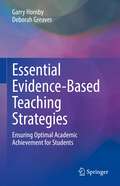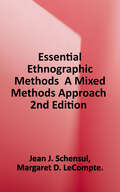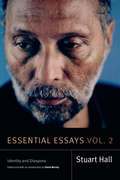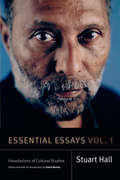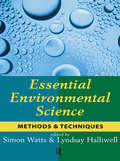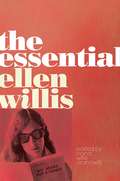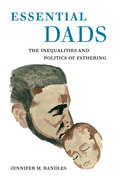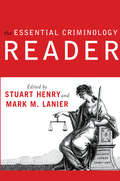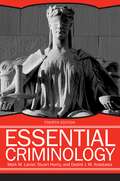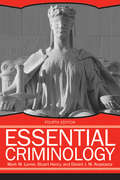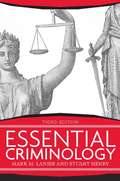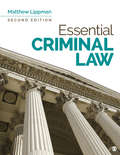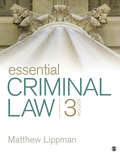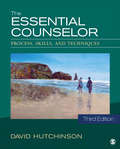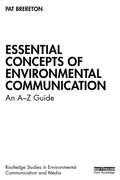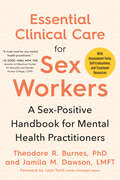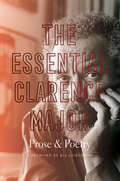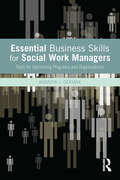- Table View
- List View
Essential Evidence-Based Teaching Strategies: Ensuring Optimal Academic Achievement for Students
by Garry Hornby Deborah GreavesThis book examines evidence-based practices that facilitate effective teaching to ensure optimum educational achievement for school-age students. It identifies key strategies with extensive research evidence that confirms their effectiveness in improving student outcomes. The book offers guidelines for teachers to use in distinguishing between strategies that are evidence-based and those with little or no supporting evidence. It describes common instructional strategies often found in schools despite having little evidence to support their effectiveness. In addition, the book identifies eight key evidence-based teaching practices that can be directly implemented by classroom teachers, reviews the theoretical and research base of each of these strategies, and provides guidelines for special and general education teachers on how to apply them most effectively, with links to video examples of their use in classrooms. The text also examines common barriers to the use of evidence-based practices in schools. It explores implications for teacher education, focusing on training educators to identify and implement evidence-based strategies effectively, avoiding those lacking evidence, even if they are popular in schools. Essential Evidence-Based Teaching Strategies is a must-have resource for researchers, professionals, and graduate students in educational psychology, child and school psychology, and social work who are interested in learning about and implementing effective teaching methods that improve student engagement and academic achievement, strengthen social-emotional learning, and reduce school dropout rates.
Essential Ethnographic Methods: A Mixed Methods Approach (Ethnographer's Toolkit, Second Edition Ser. #3)
by Jean J. Schensul Margaret D. LeCompteThis is Book 3 of 7 in the Ethnographer's Toolkit, Second Edition. Essential Ethnographic Methods introduces the fundamental, face-to-face data collection tools that ethnographers and other qualitative researchers use on a regular basis. It provides ethnographers with tools to answer the principal ethnographic questions about setting, participants, activities, behavior, and more. The essential "mixed" methods for collecting data include open-ended and focused listening, questioning strategies, participant and non-participant observation, recording techniques, visual recall, mapping the environments and contexts in which participant behavior occurs, and engaging in ethnographically informed survey research. Because these data collection strategies require ethnographers to become involved in the local cultural setting and to acquire their experience through hands-on experience, the essential tools also allow them to learn about new situations from the perspective of an "insider." With these detailed instructions, the quality and scope of the data ethnographers collect are sure to be improved.
Essential Essays, Volume 2: Identity and Diaspora (Stuart Hall: Selected Writings)
by Stuart Hall David MorleyFrom his arrival in Britain in the 1950s and involvement in the New Left, to founding the field of cultural studies and examining race and identity in the 1990s and early 2000s, Stuart Hall has been central to shaping many of the cultural and political debates of our time. Essential Essays—a landmark two-volume set—brings together Stuart Hall's most influential and foundational works. Spanning the whole of his career, these volumes reflect the breadth and depth of his intellectual and political projects while demonstrating their continued vitality and importance.Volume 2: Identity and Diaspora draws from Hall's later essays, in which he investigated questions of colonialism, empire, and race. It opens with “Gramsci's Relevance for the Study of Race and Ethnicity,” which frames the volume and finds Hall rethinking received notions of racial essentialism. In addition to essays on multiculturalism and globalization, black popular culture, and Western modernity's racial underpinnings, Volume 2 contains three interviews with Hall, in which he reflects on his life to theorize his identity as a colonial and diasporic subject.
Essential Essays, Volume 1: Foundations of Cultural Studies (Stuart Hall: Selected Writings)
by Stuart Hall David MorleyFrom his arrival in Britain in the 1950s and involvement in the New Left, to founding the field of cultural studies and examining race and identity in the 1990s and early 2000s, Stuart Hall has been central to shaping many of the cultural and political debates of our time. Essential Essays—a landmark two-volume set—brings together Stuart Hall's most influential and foundational works. Spanning the whole of his career, these volumes reflect the breadth and depth of his intellectual and political projects while demonstrating their continued vitality and importance.Volume 1: Foundations of Cultural Studies focuses on the first half of Hall's career, when he wrestled with questions of culture, class, representation, and politics. This volume's stand-out essays include his field-defining “Cultural Studies and Its Theoretical Legacies"; the prescient “The Great Moving Right Show,” which first identified the emergent mode of authoritarian populism in British politics; and “Encoding and Decoding in the Television Discourse,” one of his most influential pieces of media criticism. As a whole, Volume 1 provides a panoramic view of Hall's fundamental contributions to cultural studies.
Essential Environmental Science: Methods and Techniques
by Simon Watts Lyndsay HalliwellEssential Environmental Science brings together within a single volume the vast range of techniques, methods and basic tools necessary for the study of the environment. Environmental science has a massive area of operation, utilising the tools from a plethora of traditional sciences and social sciences. This practical manual draws on contributions from leading experts in each field, to present both general and specific environmental methods and techniques within a unique interdisciplinary environmental perspective.Essential Environmental Science offers an invaluable reference source for environmental study in both the laboratory and in the field.
The Essential Ellen Willis
by Ellen Willis Nona Willis AronowitzOut of the Vinyl Deeps, published in 2011, introduced a new generation to the incisive, witty, and merciless voice of Ellen Willis through her pioneering rock music criticism. In the years that followed, Willis's daring insights went beyond popular music, taking on such issues as pornography, religion, feminism, war, and drugs. The Essential Ellen Willis gathers writings that span forty years and are both deeply engaged with the times in which they were first published and yet remain fresh and relevant amid today's seemingly intractable political and cultural battles. Whether addressing the women's movement, sex and abortion, race and class, or war and terrorism, Willis brought to each a distinctive attitude--passionate yet ironic, clear-sighted yet hopeful. Offering a compelling and cohesive narrative of Willis's liberationist "transcendence politics," the essays--among them previously unpublished and uncollected pieces--are organized by decade from the 1960s to the 2000s, with each section introduced by young writers who share Willis's intellectual bravery, curiosity, and lucidity: Irin Carmon, Spencer Ackerman, Cord Jefferson, Ann Friedman, and Sara Marcus. The Essential Ellen Willis concludes with excerpts from Willis's unfinished book about politics and the cultural unconscious, introduced by her longtime partner, Stanley Aronowitz. An invaluable reckoning of American society since the 1960s, this volume is a testament to an iconoclastic and fiercely original voice.
Essential Demographic Methods
by Kenneth W. WachterEssential Demographic Methods brings to readers the full range of ideas and skills of demographic analysis that lie at the core of social sciences and public health. Classroom tested over many years, filled with fresh data and examples, this approachable text is tailored to the needs of beginners, advanced students, and researchers alike. An award-winning teacher and eminent demographer, Kenneth Wachter uses themes from the individual lifecourse, history, and global change to convey the meaning of concepts such as exponential growth, cohorts and periods, lifetables, population projection, proportional hazards, parity, marity, migration flows, and stable populations. The presentation is carefully paced and accessible to readers with knowledge of high-school algebra. Each chapter contains original problem sets and worked examples. From the most basic concepts and measures to developments in spatial demography and hazard modeling at the research frontier, Essential Demographic Methods brings out the wider appeal of demography in its connections across the sciences and humanities. It is a lively, compact guide for understanding quantitative population analysis in the social and biological world.
Essential Dads: The Inequalities and Politics of Fathering
by Dr. Jennifer M. RandlesIn Essential Dads, sociologist Jennifer Randles shares the stories of more than 60 marginalized men as they sought to become more engaged parents through a government-supported "responsible" fatherhood program. Dads’ experiences serve as a unique window into long-standing controversies about the importance of fathering, its connection to inequality, and the state’s role in shaping men’s parenting. With a compassionate and hopeful voice, Randles proposes a more equitable political agenda for fatherhood, one that carefully considers the social and economic factors shaping men’s abilities to be involved in their children’s lives and the ideologies that rationalize the necessity of that involvement.
The Essential Criminology Reader
by Stuart HenryInitially designed to accompany Mark Lanier and Stuart Henry's best-selling Essential Criminology textbook, this new reader is an up-to-date companion text perfect for all students of introductory criminology and criminological theory courses. The Essential Criminology Reader contains 30 original articles on current developments in criminological theory. Commissioned specifically for The Reader, these short essays were written by leading scholars in the field. Each chapter complements one of 13 different theoretical perspectives covered in Lanier and Henry's Essential Criminology text and contains between two and three articles from leading theorists on each perspective. Each chapter of The Reader features: a brief summary of the main ideas of the theory the ways the author's theory has been misinterpreted/distorted criticisms by others of the theory and how the author has responded a summary of the balance of the empirical findings the latest developments in their theoretical position policy implications/practice of their theory
Essential Criminology
by Desiré J. M. Anastasia Stuart Henry Mark M. LanierIn the fourth edition of Essential Criminology, authors Mark M. Lanier, Stuart Henry, and Desiré J. M. Anastasia build upon this best-selling critical review of criminology, which has become essential reading for students of criminology in the 21st century. Designed as an alternative to overly comprehensive, lengthy, and expensive introductory texts, Essential Criminology is, as its title implies, a concise overview of the field. The book guides students through the various definitions of crime and the different ways crime is measured. It then covers the major theories of crime, from individual-level, classical, and rational choice to biological, psychological, social learning, social control, and interactionist perspectives. In this latest edition, the authors explore the kind of criminology that is needed for the globally interdependent twenty-first century. With cutting-edge updates, illustrative real-world examples, and new study tools for students, this text is a necessity for both undergraduate and graduate courses in criminology.
Essential Criminology: A Research Guide For Criminology And Criminal Justice
by Mark M. LanierIn the fourth edition of Essential Criminology, authors Mark M. Lanier, Stuart Henry, and Desire .M. Anastasia build upon this best-selling critical review of criminology, which has become essential reading for students of criminology in the 21st century. Designed as an alternative to overly comprehensive, lengthy, and expensive introductory texts, Essential Criminology is, as its title implies, a concise overview of the field. The book guides students through the various definitions of crime and the different ways crime is measured. It then covers the major theories of crime, from individual-level, classical, and rational choice to biological, psychological, social learning, social control, and interactionist perspectives. In this latest edition, the authors explore the kind of criminology that is needed for the globally interdependent twenty-first century. With cutting-edge updates, illustrative real-world examples, and new study tools for students, this text is a necessity for both undergraduate and graduate courses in criminology.
Essential Criminology
by Mark M. Lanier Stuart HenryThis bestselling core text for crime and criminology courses has been fully revised and updated to address cutting-edge theory and fundamental world changes that are altering the way we think about crime.
Essential Criminology
by Mark M. Lanier Stuart HenryIn the third edition of Essential Criminology, authors Mark M. Lanier and Stuart Henry build upon their critical review of criminology, expanding their coverage of the multifaceted “Crime Prism,” adding boxed readings by both international theorists and students, and identifying the six fundamental world changes that are altering the way we think about crime. By reframing crime and its control in the context of global interdependence, the communications revolution, and changing perceptions of national security, the authors ask: what kind of criminology is needed for the twenty-first century? With cutting-edge updates and illustrative real-world examples of everything from Blackwater to government surveillance and Lombroso’s legacy to the global spread of disease, this text is a necessity for both undergraduate and graduate courses in criminology.
Essential Criminology
by Mark M. Lanier Stuart HenryIn the third edition of Essential Criminology, authors Mark M. Lanier and Stuart Henry build upon their critical review of criminology, expanding their coverage of the multifaceted "Crime Prism," adding boxed readings by both international theorists and students, and identifying the six fundamental world changes that are altering the way we think about crime. By reframing crime and its control in the context of global interdependence, the communications revolution, and changing perceptions of national security, the authors ask: what kind of criminology is needed for the twenty-first century? With cutting-edge updates and illustrative real-world examples of everything from Blackwater to government surveillance and Lombroso's legacy to the global spread of disease, this text is a necessity for both undergraduate and graduate courses in criminology.
Essential Criminology
by Mark M. Lanier Stuart Henry Desiré J. M. AnastasiaIn the fourth edition of Essential Criminology, authors Mark M. Lanier, Stuart Henry, and Desiré J. M. Anastasia build upon this best-selling critical review of criminology, which has become essential reading for students of criminology in the 21st century. Designed as an alternative to overly comprehensive, lengthy, and expensive introductory texts, Essential Criminology is, as its title implies, a concise overview of the field. The book guides students through the various definitions of crime and the different ways crime is measured. It then covers the major theories of crime, from individual-level, classical, and rational choice to biological, psychological, social learning, social control, and interactionist perspectives. In this latest edition, the authors explore the kind of criminology that is needed for the globally interdependent twenty-first century. With cutting-edge updates, illustrative real-world examples, and new study tools for students, this text is a necessity for both undergraduate and graduate courses in criminology.
Essential Criminal Law
by Matthew LippmanEssential Criminal Law, Second Edition equips students with a foundational and practical understanding of criminal law in the United States, as well as encourages strong legal reasoning skills for students with no prior exposure to case law. Award-winning professor and bestselling author Matthew Lippman guides students through the complexities of the legal system using thought-provoking examples of real-life crimes and legal defenses, along with highly approachable case analyses. Updated with the most current developments in criminal law and public policy, the Second Edition takes students beyond the classroom and prepares them to apply criminal law in today’s legal world.
Essential Criminal Law
by Matthew LippmanEssential Criminal Law, Second Edition equips students with a foundational and practical understanding of criminal law in the United States, as well as encourages strong legal reasoning skills for students with no prior exposure to case law. Award-winning professor and bestselling author Matthew Lippman guides students through the complexities of the legal system using thought-provoking examples of real-life crimes and legal defenses, along with highly approachable case analyses. Updated with the most current developments in criminal law and public policy, the Second Edition takes students beyond the classroom and prepares them to apply criminal law in today’s legal world.
Essential Criminal Law
by Matthew LippmanEssential Criminal Law provides a highly accessible introduction to U.S. criminal law that helps students, including those with no prior exposure to case law, build their legal reasoning skills. Drawing from more than 30 years of teaching experience, best-selling author Matthew Lippman guides readers through the complexities of the legal system using thought-provoking examples of real-life crimes and legal defenses, along with approachable case analyses. The Third Edition keep readers up to date with coverage of timely topics and the most current developments in criminal law and public policy.
Essential Criminal Law
by Matthew LippmanEssential Criminal Law provides a highly accessible introduction to U.S. criminal law that helps students, including those with no prior exposure to case law, build their legal reasoning skills. Drawing from more than 30 years of teaching experience, best-selling author Matthew Lippman guides readers through the complexities of the legal system using thought-provoking examples of real-life crimes and legal defenses, along with approachable case analyses. The Third Edition keep readers up to date with coverage of timely topics and the most current developments in criminal law and public policy.
The Essential Counselor: Process, Skills, and Techniques
by David R. HutchinsonWritten with a warm, engaging, and passionate spirit, the Third Edition of David R. Hutchinson’s The Essential Counselor comprehensively reveals the process of becoming a counselor from start to finish. Emphasizing the importance of the therapeutic alliance, this practical book provides budding and experienced counselors with real-world examples, reflection activities, and skill-building exercises that challenge and promote the critical thinking skills necessary to thrive in professional counseling environments. The fully updated Third Edition is rich with case studies and features video demonstrations of key skills needed when working with clients.
The Essential Counselor: Process, Skills, and Techniques
by David R. HutchinsonWritten with a warm, engaging, and passionate spirit, the Third Edition of David R. Hutchinson’s The Essential Counselor comprehensively reveals the process of becoming a counselor from start to finish. Emphasizing the importance of the therapeutic alliance, this practical book provides budding and experienced counselors with real-world examples, reflection activities, and skill-building exercises that challenge and promote the critical thinking skills necessary to thrive in professional counseling environments. The fully updated Third Edition is rich with case studies and features video demonstrations of key skills needed when working with clients.
Essential Concepts of Environmental Communication: An A–Z Guide (Routledge Studies in Environmental Communication and Media)
by Pat BreretonThis book draws on a broad spectrum of environmental communications and related cross-disciplinary literature to help students and scholars grasp the interconnecting key concepts within this ever-expanding field of study. Aligning climate change and environmental learning through media and communications, particularly taking into account the post-COVID challenge of sustainability, remains one of the most important concerns within environmental communications. Addressing this challenge, Essential Concepts for Environmental Communication synthesises summary writings from a broad range of environmental theorists, while teasing out provocative concepts and key ideas that frame this evolving, multi-disciplinary field. Each entry maps out an important concept or environmental idea and illustrates how it relates more broadly across the growing field of environmental communication debates. Included in this volume is a full section dedicated to exploring what environmental communication might look like in a post-COVID setting: • Offers cutting-edge analysis of the current state of environmental communications. • Presents an up-to-date exploration of environmental and sustainable development models at a local and global level. • Provides an in-depth exploration of key concepts across the ever-expanding environmental communications field. • Examines the interaction between environmental and media communications at all levels. • Provides a critical review of contemporary environmental communications literature and scholarship. With key bibliographical references and further reading included alongside the entries, this innovative and accessible volume will be of great interest to students, scholars and practitioners alike.
Essential Clinical Care for Sex Workers: A Sex-Positive Handbook for Mental Health Practitioners
by Theodore R. Burnes Jamila M. DawsonAn affirming and sex-positive guide to working with sex workers: uncovering clinical biases, creating safe spaces, and dismantling the whorearchy.Despite the wide range of sex work--from street-based to OnlyFans--clinicians too often focus on what they think sex workers need, instead of building trust, developing rapport, and really doing the work to understand the unique stressors that make quality mental health care essential for sex worker communities. Sex-positive therapists Theodore Burnes and Jamila Dawson break down everything that mental health providers need to know to work effectively with sex workers, while dispeling the tired, pervasive myths that continue to impact treatment today. Readers will learn about:Who sex workers are; different types of sex work; and sex workers&’ specific therapy needsHow outdated research methodology results in bad data and poor careThe whorearchy--the sex-work hierarchy--and why we need to dismantle it How to recognize and move beyond personal biasesHow to provide effective, affirming, and better clinical careWhat words not to use--and what they reveal about the sexism, racism, misogyny, and transphobia embedded in our society (and our practices) As sex work changes and evolves, encompassing everything from brothels to cam work, clinical care needs to catch up. This book shows you how.
The Essential Clarence Major: Prose and Poetry
by Clarence MajorClarence Major is one of America's literary masters. He has published numerous books, from novels to poetry and short story collections. Among his many accolades, he was a finalist for the National Book Award and a Fulbright scholar and received the PEN Oakland/Reginald Lockett Lifetime Achievement Award. His work has been featured in many literary journals, newspapers, and magazines, including the New Yorker, the New York Times, and Ploughshares.Whether you've known Major's work for decades or are new to his singular style, The Essential Clarence Major offers a thrilling overview of an exceptional career, from his early groundbreaking fiction to his most recent poems. Included here are excerpts from Major's best novels, a selection of his finest short stories and poetry, more than a dozen thought-provoking essays, a taste of his autobiography. Award-winning playwright, novelist, and screenwriter Kia Corthron introduces the collection, artfully illuminating Major's importance as one of the foremost and original voices in contemporary American literature.
Essential Business Skills for Social Work Managers: Tools for Optimizing Programs and Organizations
by Andrew J. GermakMany social workers find themselves in management positions within a few years of graduating from MSW programs. Most of these jobs are in nonprofit human service organizations in which, increasingly, business acumen is necessary to maintain grants and donations, start new programs, market services to clients, supervise the finance function, and understand the external environment. This book teaches MSW students and early-stage social work management practitioners the essential business skills needed to manage programs and organizations; to improve their overall management toolkit for finding a better job or getting promoted; and, ultimately, to gain parity with other managers holding MBA degrees and working in the human service space. This text can serve as a desk reference for managers to troubleshoot various situations. It is also appropriate for social work macro practice courses at the undergraduate and graduate levels, as well as courses that cover human resource management and financial management.?
